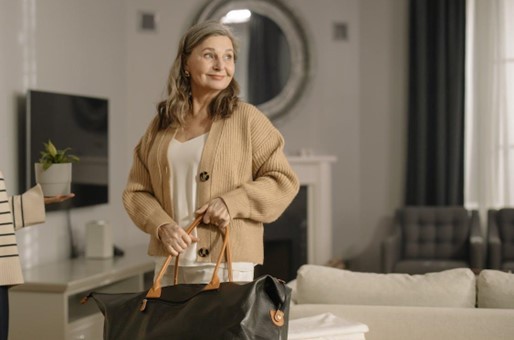Tips for Keeping Your Aging Parents Safe

Keeping our aging parents safe often means making changes to their lives as well as ours. Most seniors strive to remain independent as they get older, but they eventually need more assistance, especially around the house. Presented below by the Caregiver Resource Network, here are some steps you can take to help your senior loved ones as they age.
Decide Whether to Rent or Sell their Previous Home
Early on, if the decision is made to move, you’ll need to determine whether selling the old home or renting it out is the best option. Renting out is a popular option, as an extra revenue stream will help pay for their new home. If your loved one decides to downsize and move into a rented home or apartment, research the market to see what they can afford and what neighborhoods are ideal for them. This will also give them an idea of how much they can charge renters of their old home.
If your aging parents are planning on selling their home in order to move to more suitable accommodations, help them get their house on the market by assessing the property's condition and making the necessary repairs. Take time to declutter, sell and donate items and furniture your parents no longer need or want. Put a fresh coat of paint on the walls and replace or steam-clean the carpets and drapes. Also, don’t forget the exterior of the house: power-wash the driveway and sidewalks, and consider repainting the front door to create curb appeal.
Important Qualities of a Property for Aging in Place
If your senior loved one is independent enough to remain at home, you should make modifications to the house to ensure their safety. Some improvements are easy to undertake yourself; for others, you will need to hire professionals. There should be at least one entrance to the house that is step-free, in order to be wheelchair accessible.
The main level should have a bedroom, bathroom, and kitchen with easy-to-reach shelves, cupboards, and cabinets. Make sure to add grab bars in the shower to help with balance. If the house has stairs, they should be well-lit and carpeted or feature a non-slip surface to prevent falls.
Consider installing a video security system, too. There are great independant cameras and video doorbells that you can set up and manage on your own without expensive contracts. Most of these devices are easy enough to troubleshoot that you can manage those issues on your own, too.
Whether they’re aging in place in their current home or a new rental, don’t neglect to make the outside of the house safer for your senior, too: the house number should be clearly visible from the street in case of an emergency, to help ambulances and EMTs find your senior’s home. Exterior pathways should be looked at to make sure there are no holes or uneven pavement that would cause someone to trip, and no leaves or other debris that could become slippery when wet.
Hire a landscaping service if you need to modify the layout to better suit your loved one’s needs. Make sure to ask if they are offering special deals in your area. If you need to finance your backyard remodeling project, landscaping loans get funded fast and have fixed interest rates and payments.
Provide the Support They Need
If you plan on providing more hands-on help to your senior loved one, especially if they need help with daily activities like meals, grooming, and exercise as well as with their bookkeeping and finances, medications, and doctors appointments, it’s a good idea to be nearby. Building an in-law suite or, as REthority points out, adding a granny pod on the property will let you and your aging parent live independently from each other, but close enough that you can be there in a heartbeat should they need anything or have an emergency.
Those small units offer all the comforts of home with extra safety features for seniors. To help your parent outfit their new space, take some time to consult reviews for home products that can make life easier for them. Finding the right home products can help facilitate comfort and independence for them.
While you support your loved one, keep your own needs at the top of your priority list, too. And if you need help or resources regarding how to manage your caregiving needs or even decisions for your loved one, check out Caregiver Resource Network!
When Moving to a Care Home
It is estimated that one in five Americans has the responsibility of caring for an older parent, and that only 4.5% of older adults live in nursing homes according to Zippia, their care coming to an average of $7,000 a month. If your aging parent needs skilled or nursing care that you are unable to provide, it’s time to consider an assisted living facility. There are four main types of residential care facilities notes SeniorAdvisor.com, and choosing one will mostly depend on the level of care your senior loved one needs:
- Independent or senior living, which provides transportation and entertainment, but no health care services;
- Assisted living which provides basic health services along with daily activities;
- Skilled nursing homes for seniors who need nursing care 24 hours a day;
- Continuing care retirement communities for seniors with declining health conditions. For people with Alzheimer’s or dementia, a memory care facility is probably the safest option.
Manage Your Work Responsibilities
Moving into a new space, however far or near that may be, brings with it a whole new set of logistical challenges, especially when your loved one is a business owner and works from home. Moving offices requires a strategy that should include planning as early as possible, having an inventory of all the equipment such as computers and furniture, and carefully labeling boxes so that unpacking can happen quickly and downtime will be reduced.
If you decide that it is time to close or sell your business before the move, it's important to get an accurate valuation that accounts for your debts and assets before you move forward. You’ll also need to communicate your decision with your customers and, depending on your business structure, with your stakeholders.
Support Your Aging Loved One
For our senior loved ones, safety is a priority. Take measures to prevent falls and injuries, look at the living options available (whether that’s buying a new home, looking into a rental, and possibly moving their business), and make an informed decision on what is best for your parents and for the whole family.
Image via Pexels
Claire Wentz is a former home health nurse and recognizes that our aging population means many more people will become senior caregivers over the years. Ms. Wentz created Caring From Afar to offer support and advice to caregivers who are unable to live near their loved ones.
Tagged:

